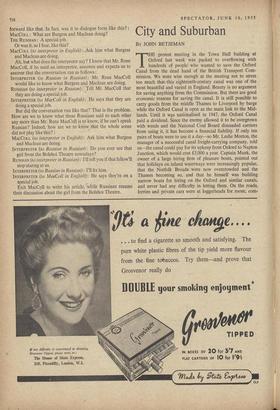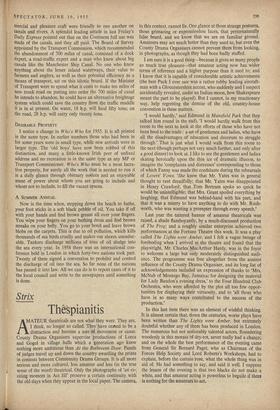City and Suburban
BY JOHN BETJEMAN HE protest meeting in the Town Hall building at Oxford last week was packed to overflowing with hundreds of people- who wanted to save the Oxford Canal from the dead hand of the British Transport Com- mission. We were wise enough at the meeting not to stress too much that .this eighteenth-century canal was one of the most beautiful and varied in England. Beauty is no argument for saving anything from the Commission. But there are good economic reasons for saving the canal. It is still possible to carry goods from the middle Thames to Liverpool by barge while the Oxford Canal is open as the main link to the Mid- lands. Until it wps nationalised in 1947, the Oxford Canal paid a dividend. Since the enemy allowed it to be'overgrown with weeds and the National Coal Board dissuaded carriers from using it, it has become a financial liability. If only ten pairs of boats were to use it a day—so Mr. Leslie Morton, the manager of a successful canal freight-carrying company, told us—the canal could pay for its upkeep from Oxford to Napton Junction, which would cost £5,000 a year. Captain Munk, the owner of a large hiring firm of pleasure boats, pointed out that holidays on inland waterways were increasingly popular, that the Norfolk Broads were now overcrowded and the Thames becoming so, and that he himself was building narrow boats for hiring on the Oxford and similar canals, and never had any difficulty in letting them. On the roads, lorries and private cars were at loggerheads for room; corn- mercial and pleasure craft were friendly to one another on canals and rivers. A splendid leading article in last Friday's Daily Express pointed out that on the Continent full use was made of the canals, and they all paid. The Board of Survey appointed by the Transport Commission, which recommended the abandonment of 700 miles of canal, consisted of a dock expert, a road-traffic expert and a man who knew about big canals like the Manchester Ship Canal. No one who knew anything about the lesser inland waterways, their value to farmers and anglers, as well as their potential efficiency as a means of transport, sat on this idiotic board. If the Minister of Transport were to spend what it costs to make ten miles of new trunk road on putting into order the 700 miles of canal he intends to abandon, he could have an alternative freightage system which could save the country from the traffic muddle it is in at present. On water, 18 h.p. will haul fifty tons; on the road, 28 h.p. will carry only twenty tons.
DESIRABLE PROPERTY I notice a change in Who's Who for 1955. It is all printed in the same type. In earlier numbers those who had been in for some years were in small type, while new arrivals were in larger type. The 'old boys' have now been robbed of this distinction, and many a little-known Irish peer of unfixed address and no recreation is in the same type as any MP or Transport Commissioner. Who's Who must be a most lucra- tive property, for surely all the work that is needed to run it is a daily glance through obituary notices and an enjoyable sense of power about whom you are going to include and whom not to include, to fill the vacant spaces.
A SUMMER ANNUAL Now is the time when, stepping down the beach to bathe, your foot sticks in a soft black pebble of oil. You take if off with your hands and find brown grease all over your fingers. You wipe your fingers on your bathing dress. and find brown streaks on your belly. You go to your hotel and leave brown blobs on the carpets. This is due to oil pollution, which kills thousands of sea birds cruelly and makes our shores unendur- able. Tankers discharge millions of tons of oil sludge into the sea every year. In 1954 there was an international con- ference held in London in which forty-two nations took part. Twenty of these signed a convention to prohibit and control the discharge of oil into the sea. So far none of the nations has passed it into law. All we can do is to report cases of it to the local council and write to the newspapers until something is done.











































 Previous page
Previous page